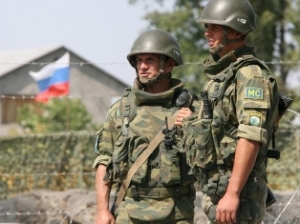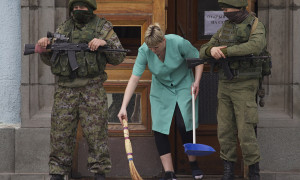Recalling similar fabrications regarding Georgia’s aggression versus Russia and examining existing Russo-Ukrainian strategic relations before Western-backed mobs overthrew the government in Kiev, we can see there is no “invasion” at all.
In hindsight, it was easy for the BBC and other news outlets to admit Georgia provoked the conflict that at the time, was framed as the “Russian invasion of Georgia.” In Contrast, hysterical articles from 2008, like the Daily Mail’s “Georgia ‘overrun’ by Russian troops as full-scale ground invasion begins,” featured outlandish war propaganda aimed at demonizing Russia and absolving both the West and their client regime led then by Georgian President Mikheil Saakashvili, of a conflict of their own design.
Russia at the time, was not “invading” Georgia – but rather pushing back US-trained, armed, and backed Georgian forces from their own armed invasion into South Ossetia. It was an engineered provocation designed to test Russian resolve and chip away at Russia’s territorial integrity as well as its influence along its immediate peripheries.
With tensions building in Ukraine, after Western-backed Neo-Nazis, ultra-nationalists, and other assorted bigots, hooligans, and militants overran the elected government in Kiev, the “Russian invasion of Georgia” narrative has been reanimated, admissions of its inaccuracy quickly forgotten, and is being used as an analogy to peddle the newly christened “Russian invasion of Ukraine” narrative.
However, once again, Russia is not “invading” anything. Long before the West began sowing political chaos in Kiev, Russian troops had long been permanently stationed within the country. Ukraine, and in particular, eastern Ukraine including the Crimea peninsula, share a common heritage, history, linguistics, socioeconomic interests, and defense agreements both past and present.
The BBC itself reports in its article, “Ukraine crisis: Does Russia have a case?,” that (emphasis added):
Under the 1994 Budapest Memorandum, the US, Russia, Ukraine and the UK agreed not to threaten or use force against the territorial integrity or political independence of Ukraine. They also pledged never to use economic coercion to subordinate Ukraine to their own interest.
Russia says its decision to send troops into Ukraine is necessary to protect Russian citizens.
There is an ethnic Russian majority in Ukraine’s autonomous republic of Crimea. Russia’s Black Sea fleet is based at Sevastopol, where much of the population have Russian passports. But the US insists there is no legal basis for the Russian move, accusing Moscow of acting unilaterally in violation of its commitment to Ukraine’s sovereignty. The G7 group of leading economies agrees.
Under the terms of its agreement with Ukraine, Russia is entitled to have 25,000 troops on the peninsula and currently has an estimated 16,000 deployed there. But these troops have to remain on base. Pro-Russian troops have been deployed across Crimea. Moscow insists they are local self-defence forces, but there are widespread reports that they are from Russia.Clearly, the presence of Russian troops in Ukraine, already stationed there permanently long before the West began destabilizing the country are in line with the 1994 Budapest Memorandum. Clearly the covert destabilization of Ukraine by Western backers, as well as both economic and diplomatic coercion via engineered regime change in Kiev to subordinate Ukraine to the West’s (EU’s) own interests is in direct violation of the treaty. The BBC peddles the notion that Russian troops – beyond those already legally stationed there – have been deployed across Crimea. However Russia has officially denied this, and the BBC fails to prove otherwise, simply citing unqualified “widespread reports,” a dubious practice repeated across the West’s mass media and around its diplomatic circles.
Skewed Narrative a Symptom of Weakness and Desperation

The Daily Beast makes a number of absurd assertions, including that the Crimea region is not under threat of Neo-Nazis. However, that is because the Neo-Nazis are in Kiev, part of the Western-backed opposition that overthrew the democratically elected government of Viktor Yanukovych, and had Russian troops not been permanently stationed in the Crimea region, Neo-Nazis would probably have infested the east of Ukraine as well.
While the Daily Beast contents there are no “extremists” for the Russians to protect Ukraine from, the burning question is why would the government in Kiev have fled with armed police and military protecting them, if there weren’t heavily armed extremists involved? Stories of snipers brought in by the opposition appear to be only the tip of the iceberg in terms of revealing the true depth and nature of armed operations carried out during the Western-backed putsch.
Perhaps what is worst of all regarding the West’s propaganda regarding Ukraine, is not the hypocrisy and tired lies exposed by its meddling elsewhere, but the fact that Ukraine itself had already been destabilized politically by the West before, admittedly, during the so-called “Orange Revolution.”
The Guardian would admit in its 2004 article, “US campaign behind the turmoil in Kiev,” that:
With their websites and stickers, their pranks and slogans aimed at banishing widespread fear of a corrupt regime, the democracy guerrillas of the Ukrainian Pora youth movement have already notched up a famous victory – whatever the outcome of the dangerous stand-off in Kiev.
Ukraine, traditionally passive in its politics, has been mobilised by the young democracy activists and will never be the same again.
But while the gains of the orange-bedecked “chestnut revolution” are Ukraine’s, the campaign is an American creation, a sophisticated and brilliantly conceived exercise in western branding and mass marketing that, in four countries in four years, has been used to try to salvage rigged elections and topple unsavoury regimes.
Funded and organised by the US government, deploying US consultancies, pollsters, diplomats, the two big American parties and US non-government organisations, the campaign was first used in Europe in Belgrade in 2000 to beat Slobodan Milosevic at the ballot box.
Richard Miles, the US ambassador in Belgrade, played a key role. And by last year, as US ambassador in Tbilisi, he repeated the trick in Georgia, coaching Mikhail Saakashvili in how to bring down Eduard Shevardnadze.
Clearly, the West has violated both international norms and various treaties it has signed and is bound to with its repetitive and destructive meddling in Ukraine’s affairs, as well as in other nations along Russia’s borders. The intent is clear – the geopolitical encirclement of Russia – a strategy that should the Russians ever employ against the territorial United States, would most likely be interpreted as an act of war, prompting a strong military response.
The notion of Russia “invading” a nation it is historically, economically, and militarily tied to, including already having thousands of troops permanently stationed there, is a Western fabrication serving as cover for Western meddling now being put into check. For people around the world, should they fail to learn the lessons of history regarding Western meddling and the lies they use to couch their agenda behind, the dangerous and needless confrontation between the West and Russia will only grow. Today it is the lives of Ukrainians that hang in the balance. Tomorrow it could the rest of us.

